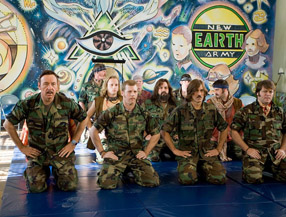|
|
Book vs. Movie: The Men Who Stare At GoatsBy Russ BickerstaffNovember 10, 2009
Of particular note here is the Eric Olson's search for the truth of his father's death in the midst of the U.S. Government's MK-ULTRA mind control experiments. The official government story is that Olson's father jumped out of a window in New York as a result of government use of LSD with respect to MK-ULTRA. Olson's been obsessed with trying to get to the truth behind the story. Ronson's treatment of the human end of this really brings the fantastic elements of the novel into full, vivid emotional reality. There's a dark side out there and it's difficult to distinguish fact from fantasy in a shadowy world of intelligence and counter intelligence. The Movie In principle, the idea behind the film adaptation of the novel should have worked. In a way, it kind of did. The idea of turning a disjointed narrative into single, coherent action/adventure plot is a sound and cautious one. The idea of fusing the dozen or more people who figure prominently in Ronson's novel together into simple Hollywood character types makes clean, economic sense. Having those characters played by some really talented, big name Hollywood actors also makes a lot of sense. Limiting the plot to coverage of only the central issues of the book with only occasional glances at some of the book's other details is very practical. In theory, all of these decisions could've made for a really interesting narrative film adaptation of the book. The film consistently fails to execute any of these ideas in any practical way.
[ View other columns by Russ Bickerstaff ]
[ View other Book vs. Movie columns ]
[ Email this column ]
|

|
|
|

|
Wednesday, May 1, 2024
© 2024 Box Office Prophets, a division of One Of Us, Inc.


